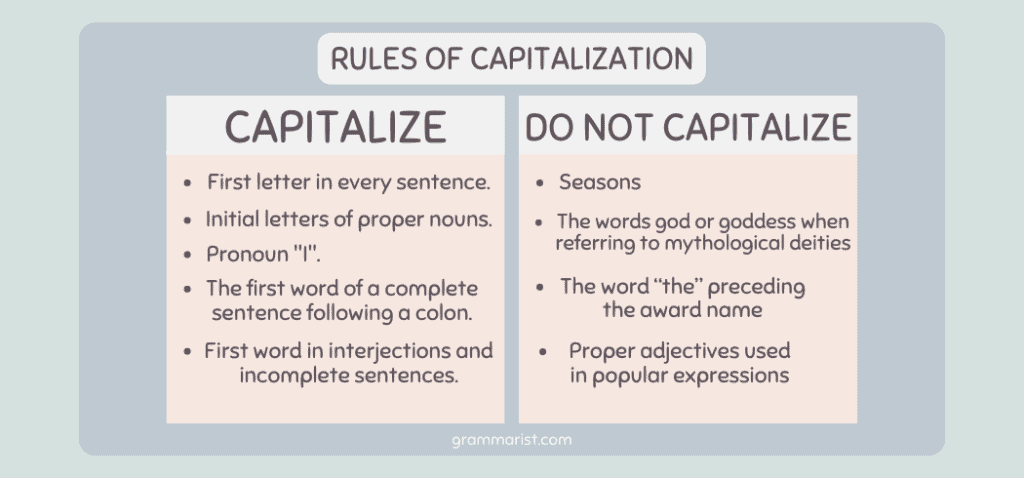
In all my years of teaching grammar and conventions, the simplest rules seem to be the hardest for many students to remember.
As surprising as it is, the elementary lesson of capitalization use is often the most elusive – and these basic errors create confusing sentences. The writing also ends up looking incomplete and it is difficult for future employers to take anyone seriously when basic grammar is ignored.
Let’s review the rules of capitalization to help you remember how they should be applied so your writing is clear, concise, and understandable.

You were most likely first introduced to the rules of capitalization in early elementary school. Capitalization serves an important role in writing to indicate important words and signal new thoughts.
For capitalization in English, there are three common rules on which everyone can agree:
But, there are many rules governing the use of capitalization, and we are going to review the most widely accepted rules below.
The most widely used and recognized rule of capital letters is to capitalize the first word of a sentence. They serve as a visual clue to the reader by making certain words stand out more prominently on a page.
Capital letters signal the start of a new idea in a sentence.
Capitalize the first word in declarative, interrogative, imperative, and exclamatory sentences.
Capitalize the first word in interjections and incomplete sentences.
Capitalize the first word of a complete sentence following a colon. If a list or dependent clause or phrase follows a colon, it is not a complete sentence and, therefore, no capital letter is used.
Capitalize the first word in the quotation at the quotation is a complete sentence.
Capitalize the first word in each line of most poetry even if the line does not begin a new sentence.
I watched it stream
Gently down to earth
Capitalize I and O through a sentence.

Proper nouns are nouns that name a specific person, place, or thing. They must be capitalized to properly indicate their importance to a sentence.
Capitalize all proper nouns, including each part of a person’s name.
The given first, middle, and surname (last name) of a person must be capitalized, as do initials.
Capitalization beginning with la, le, de, Mac, van, von, or D’ may vary depending on the family spelling and preference of the name.
Capitalize the proper names of animals.
Capitalized geographical names.
Street names, towns, cities, counties, states, provinces, countries, continents, valleys, mountains, rivers, and oceans are all capitalized. If it can be found on a map, capitalize it.
Compass points are only capitalized if they are referring to a specific location.
Capitalize the names of monuments, buildings, and meeting rooms or classrooms
Capitalize the names of specific events, such as historic periods, events, documents, days and months, holidays, and special events.
Do not capitalize the seasons.
Capitalize the names of various organizations, businesses, government bodies, political parties, nationalities, and languages.
Capitalize references to religions, deities, religious figures, holy books, and religious sculptures.
Do not capitalize the words god or goddess when referring to mythological deities, but do capitalize their proper names.
Capitalize the names of awards. Do not capitalize the word “the” preceding the award name.
Capitalize the names of specific types of air, space, and land craft.

Proper adjectives are proper nouns used as an adjective, or are formed from a proper noun.
Capitalize most proper adjectives.
Proper adjectives used in popular expressions are not capitalized.
Capitalize brand names used as adjectives.
Do not capitalize prefixes attached to proper adjectives unless the prefix refers to a nationality.
In a hyphenated adjective, capitalize only the proper adjective.
Capitalize a person’s title when it is used with the person’s name or when it’s used in direct address in place of a person’s name.
Do not capitalize if used as a general reference.
Capitalize titles of government officials when they are followed by a proper name or used in direct address.
Do not capitalize if used as a general reference.
Capitalize titles of certain high government officials if they refer to the incumbent even when the titles are not followed by proper name or used in direct address.
Capitalize the important words in the compound titles, but not prefixes and suffixes added to the title.
Capitalize titles showing family relationships when they refer to a specific person unless they are preceded by a possessive noun or pronoun.
Capitalize abbreviations of titles before and after names.
Capitalize the first word and all other key words in the titles of books, periodicals, poems, stories, plays, paintings, and other works of art.
Capitalize titles of courses when the courses are language courses or when the courses are followed by a number.
In modern writing, there are simultaneous trends toward and away from capitalization. The trend in informal writing and much journalistic writing is away from it. Meanwhile, there is an unfortunate trend in business, corporate, and marketing writing to capitalize words for emphasis or to give words a little extra heft.
But if you use instant messaging, text messaging, email, or social networking, you’ve probably noticed that many people don’t capitalize at all in these mediums.
Regardless of what writers do in business and marketing (where trying to enforce good writing is a lost cause), the best rule of thumb for capitalization is to err on the side of minimalism. Follow the rules listed above, avoid capitalizing common nouns just because other people do, avoid capitalization for emphasis (that’s what italicization is for), and never use all caps (LIKE THIS). Beyond those guidelines, here are a few other points:
There are many instances in which you will use a capitalization, but all mainly follow the three common rules: capitalize the first letter of every sentence, the initial letter of proper nouns, and the pronoun “I”.
If you can remember this, then it is easier to apply them to the scenarios in which a capital letter is required.
Use the above guidelines for capitalization to answer any questions you may have and help make corrections to your own writing.